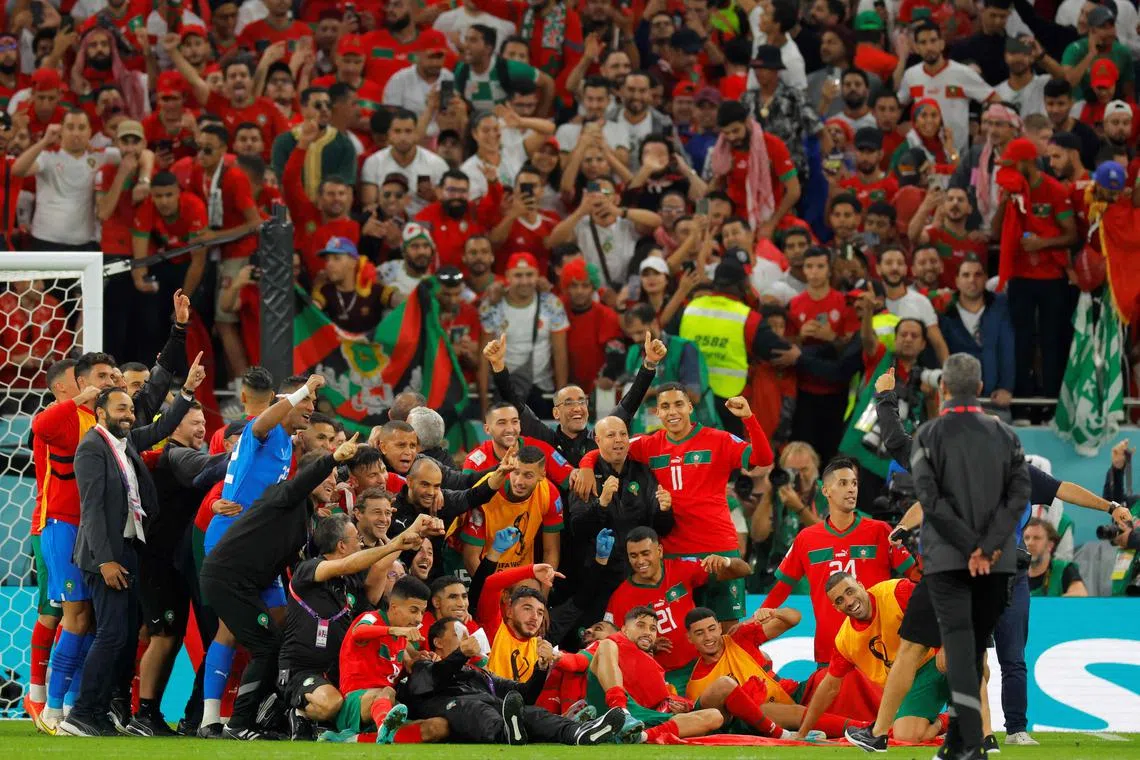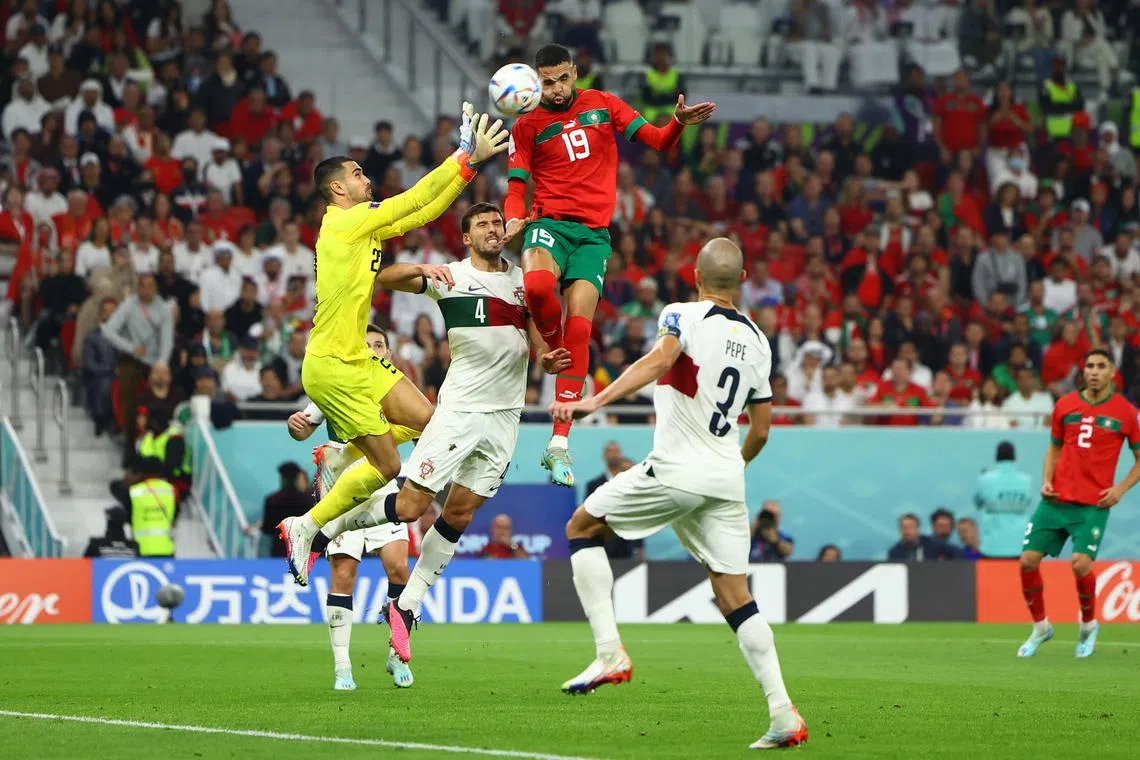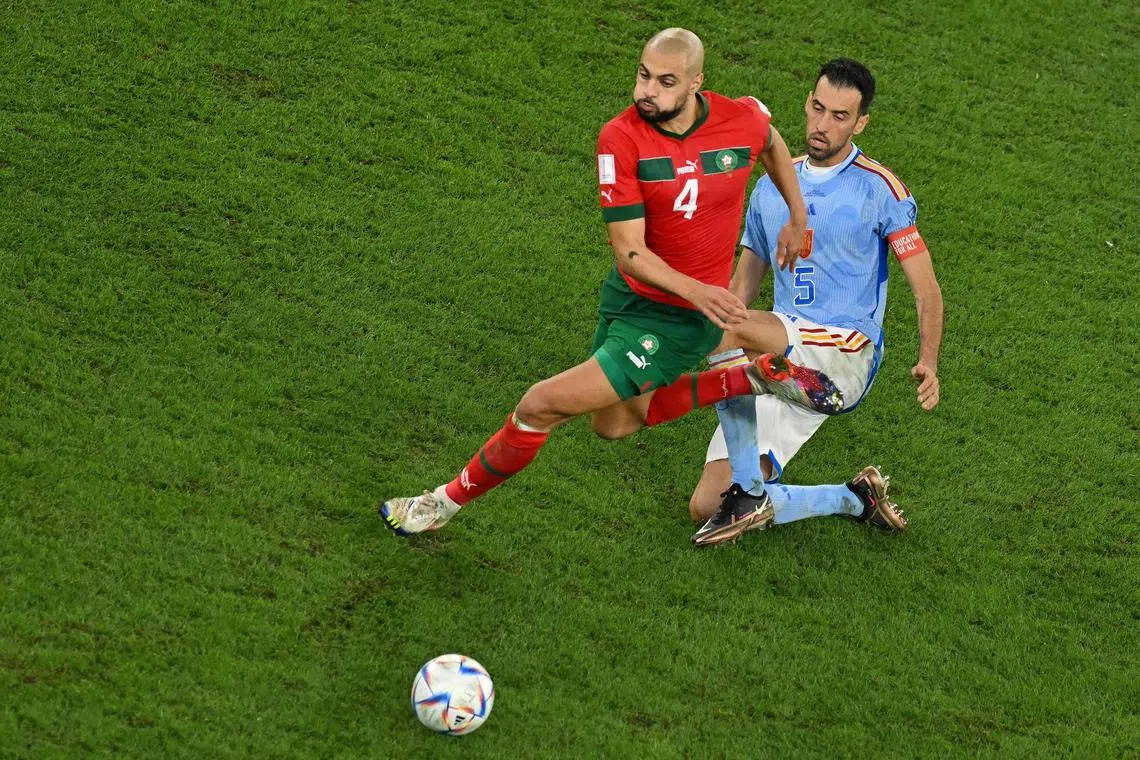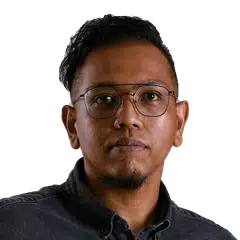World Cup: The keys to Morocco’s history-making miracle run
Sign up now: Get the biggest sports news in your inbox

Morocco is the first African and Arab nation to reach the World Cup semi-final.
PHOTO: AFP
DOHA – It was close to 3am on Sunday when a jeep adorned with multiple Morocco flags – one wrapped around its spare tyre on the back and several others billowing in the wind off its sides – zipped along Wadi Msheireb Street towards Souq Waqif, accompanied by pulsing Arabic music and joyous honks.
Hours earlier, Morocco had become the first African and Arab nation to reach the World Cup semi-finals after defeating Portugal 1-0,
The Atlas Lions, ranked 22nd in the world, have beaten three of the world’s top 10 teams to get to this stage and, on Wednesday, face a fourth-ranked France side powered by an in-form Kylian Mbappe. It is arguably their toughest test yet on this miracle run.
An unshakable support
As the tournament nears an end, the crowd in Qatar have generally thinned. No longer do we see rambunctious Senegalese fans dancing in the metro stations and on trains, or colourful Mexican supporters donning wonderfully eccentric tricolour costumes roaming the streets. But the Moroccan backing has swelled.
Fans scrambled to get seats on seven additional flights from Casablanca to Doha that Royal Air Maroc ran for the Portugal game, and another 30 extra flights have been offered ahead of the semi-final. These late arrivals will boost the fanatical backing the team have received here.
When The Straits Times visited the team’s base at Wyndham Doha West Bay on a chilly Monday evening, about 20 supporters lined the street, hoping to catch a glimpse of their heroes. While waiting, they mingled and showed each other videos of celebrations at previous games.
One of them was Hamza, 29. Wearing a fez and the Moroccan flag as a cape, he said: “This team have gone far beyond what anyone thought they could achieve. Whatever happens from now, they are already heroes to us and so many others all over the world.”
With the number of Arab players in their squad and cultural similarities between the two nations, Morocco have been embraced as a “home” side in Qatar.
When they beat Belgium 2-0 in the group stage, an overwhelming majority of the 44,000 in the stands roared them on, hissing each time a Belgian touched the ball.
Beyond these borders, millions have also thrown their weight behind the team, who are the first from a Muslim-majority country to progress this far at the World Cup since Turkey in 2002.
Their celebrations after goals and wins over the past few weeks have often featured them prostrating collectively in prayer, a gesture which resonates with many North Africans, Arabs and Muslims worldwide.
Even neutrals have been swayed. A clip of winger Sofiane Boufal dancing with his mum on the pitch after the Portugal win, and images of defender Achraf Hakimi and coach Walid Regragui embracing their mothers in the stands after earlier victories have gone viral on social media. How could one not like this team?
Diaspora of talent
This team represent more than just North Africa, Arab or Muslims. Only 12 of their 26 players were born in Morocco – the lowest ratio at the World Cup. The others are of Moroccan heritage and include Montreal-born goalkeeper Yassine Bounou, Madrid-born Hakimi, Paris-born Boufal and Dutch-born trio Noussair Mazraoui, Sofyan Amrabat and Hakim Ziyech.
A number of them, including Amrabat and Ziyech, have even played for their country of birth at age-group levels before committing their senior international future to the land their parents hail from.
This policy is shrewd, given Moroccans are one of the largest migrant groups in Europe, estimated at some five million.
Still, Regragui, born in France, said after the win over Spain in the round of 16 that he had “problems” convincing some critics that foreign-born players are as committed to the cause.
“Today we have shown that every Moroccan is Moroccan,” he said.
“When he comes to the national team, he wants to die, wants to fight.”
He added that the diversity of their players helped create a unique amalgamation of the best football cultures from various European nations.
More obscure, local-born players have played a part as well.
Yahia Attiyat Allah, a left-back from Moroccan club Wydad, where Regragui coached before his appointment with the national team, for example, swung in the cross for Fez-born Youssef En-Nesyri to head home the winning goal against Portugal.
There has also been support from the monarchy.
In 2009, the Royal Moroccan Football Federation – with backing from King Mohammed VI to the tune of £12 million (S$20 million) – decided to revamp its football development set-up.
The Mohammed VI Football Academy was the centrepiece of the new project. It sought to unearth talent in the Moroccan diaspora across Europe.
Of the current squad in Qatar, defender Nayef Aguerd, midfielder Azzedine Ounahi and striker En-Nesyri are graduates of the academy.
Unapologetically pragmatic
That En-Nesyri header is one of just five goals Morocco have scored in five games, an unimpressive statistic but one that does not bother Regragui.

Morocco’s Youssef En-Nesyri leaps highest to score the winning goal against Portugal.
PHOTO: REUTERS
The coach, who was hired only in August,
Incredibly, Morocco have yet to let an opponent score, including a penalty shoot-out with Spain.
They have conceded just once, against Canada, through an own goal by defender Aguerd.
Some critics have labelled their tactics “anti-football”, but it would be remiss to think all Morocco do is defend for the entire game.
They maximise their openings and move the ball quickly and directly when given the opportunity. Like they did against Belgium and Portugal.
Portuguese defender Pepe summed it up best: “We conceded a goal we didn’t expect... (And) they didn’t let us play in the second half.”
In an interview with Fifa before the tournament, Regragui said: “I used to place a lot of emphasis on possession and maintaining a high-energy press but I’ve become more pragmatic over the years. When... winning is all-important, you learn to adapt. I adapt depending on the potential within a team.”
Morocco have quality in the right areas to pull off his game plan perfectly. In the heart of defence, the partnership of experienced Romain Saiss – who moved to Turkish side Besiktas in June but was an English Premier League regular for the previous four seasons with Wolverhampton – and West Ham’s Aguerd, is dependable, with Sevilla’s Europa League winner Bounou behind them.
Paris Saint-Germain’s Hakimi and Bayern Munich’s Mazraoui are elite fullbacks and give the team speed and width.
Amrabat, the Fiorentina midfielder whom Regragui described as “world class”, has won possession a tournament-high 41 times, and he is ably assisted by breakout star Ounahi, 22, who features for French Ligue 1 side Angers after playing third-tier football just 18 months ago.
And with Chelsea’s Ziyech pulling the strings and Bounou’s clubmate En-Nesyri leading the line, there is just enough cutting edge to make Morocco a threat to even the best sides.

Sofyan Amrabat (front), here winning the ball off Spain’s Sergio Busquets, has been described as “world class.”
PHOTO: AFP
Can they do the impossible?
Lying in their path to an improbable final are defending champions France, who boast Mbappe and Olivier Giroud, with nine goals between them, and are stacked with players with big-game experience.
Les Bleus are seeking their own piece of history. No team since Brazil (1958, 1962) have won back-to-back Cups. The French showed in their quarter-final against England that they have the nous to negotiate tricky games, even when they are not at their best.
At least, the Moroccans have some inside knowledge. Saiss and Boufal are France-born, Hakimi will defend the flank clubmate Mbappe attacks from while Regragui, a former defender, is familiar with Giroud. Both were at French side Grenoble in 2008.
The odds, however, are not in Morocco’s favour, even if their last encounter was a 2-2 draw in an international friendly in 2007.
But as the past few weeks have shown, this suits Regragui and his players just fine. Why shouldn’t they dream, when they are roared on by their continent, their country and their mothers?



